#Heat Pump
Explore tagged Tumblr posts
Text
Dandelion News - April 1-7
Like these weekly compilations? Tip me at $kaybarr1735 or check out my Dandelion Doodles! Last month’s Doodles are free to the public, so go take a look :D
1. Galapagos tortoises at Philadelphia Zoo become first-time parents at nearly 100

“Mommy, the female tortoise, is considered one of the most genetically valuable Galapagos tortoises in the Association of Zoos and Aquariums’ species survival plan. [… T]he zoo said it is “overjoyed” at the arrivals of the four hatchlings, a first in its more than 150-year history.”
2. Massachusetts home-electrification pilot could offer a national model

“In total, the program is providing free or heavily subsidized solar panels and heat pumps to 55 participating households, 12 of which also received batteries at no cost. […] It’s a strategy that program planners hope can help address the disproportionate energy burden felt by lower-income residents of the region[….]”
3. National Park Rangers rebel against queer erasure on Trans Day of Visibility

“[… A] group of over 1,000 off-duty, fired, and retired National Park Service employees launched Rangers Uncensored, an online archive that restores and amplifies LGBTQ+ stories quietly scrubbed from government websites since President Donald Trump’s second inauguration.”
4. World's largest wildlife crossing reaches critical milestone

“Over the next few days they'll be adding 6,000 cubic yards of specially manufactured soil to cover the crossing, a mix of sand, silt and clay inoculated with a bit of compost and hyperlocal mycorrhizal fungi, carefully designed and tested to mimic the biological makeup of native soils around the site.“
5. Bipartisan bill to boost green building materials glides through House

“[B]ipartisan legislation the House of Representatives passed in a 350-73 vote last week would give the Department of Energy a clear mandate to develop a full program to research, develop, and deploy clean versions of the building materials.”
6. Tribal Wildlife Grants Funding Announced
“Tribal Wildlife Grants are intended to help Tribes develop programs for the conservation of habitat and species of traditional or cultural importance[….] Typically funded projects include: conservation planning, fish and wildlife management and research, habitat mapping and restoration, inventory and monitoring, and habitat preservation. […] A total of $6.1 million is available for this round of funding[….]”
7. Germany adds another one million PV arrays to take solar total to 104 gigawatts
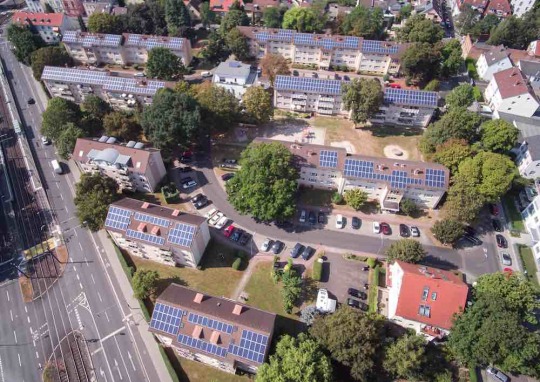
“Following a rapid rise in household solar panel installations, Germany’s total number of PV arrays has passed the five million “milestone[.…]” Solar systems already cover almost 15 percent of Germany’s electricity demand, BSW-Solar said. […] The total capacity of all PV systems installed in Germany surpassed 100 GW at the start of the year.”
8. Stronger together: Bilby conservation efforts enhanced by Indigenous knowledge

“Ms. Geyle said the results showed combining [conventional science and traditional tracking methods] more accurately estimated bilby abundance than using either technique individually[….] "[… ensuring] that Indigenous people remain central to decision-making about their lands and species that inhabit them," Ms. Geyle said.”
9. Lennar will build 1,500new Colorado homes with geothermal heat pumps

“The homebuilder is partnering with Dandelion Energy to install the tech, which is efficient but expensive — unless it’s built into new homes from the start. […] And by eliminating the need for new gas pipelines and reducing the peak electricity demands on the power grid, subdivisions built on this model could save a bundle on utilities as well[….]”
10. New strategy launched to protect Tanzanian biodiversity hotspot

“Conservationists have launched a 20-year-long project to protect what is arguably Tanzania’s most biologically rich landscape: the Udzungwa Mountains. The strategy places notable emphasis on communities living here, with more than half of its budget allocated to social and economic projects and managing human-wildlife conflict.”
March 22-28 news here | (all credit for images and written material can be found at the source linked; I don’t claim credit for anything but curating.)
#hopepunk#good news#nature#philadelphia#zoo#galapagos#tortoise#solar panels#clean energy#national park service#lgbt+#lgbt#lgbtq#park ranger#wildlife#us politics#ecology#green infrastructure#indigenous#habitat restoration#germany#solar energy#solar power#australia#geothermal#heat pump#energy efficiency#biodiversity#tanzania#animals
227 notes
·
View notes
Text
"Governor Janet Mills announced that Maine has, two years ahead of time, surpassed its goal of installing 100,000 new heat pumps by 2025, a milestone that represents significant progress in reducing Maine’s reliance on heating oil, lowering heating costs, and curbing harmful carbon emissions.
To continue Maine’s momentum, Governor Mills also unveiled a new target: installing another 175,000 additional heat pumps in Maine by 2027, thereby bringing the number of heat pumps installed in Maine homes, businesses, and public buildings during her time in office to 275,000.
If this target is achieved, Maine would have more than 320,000 heat pumps in total installed across the state.
Heat pumps can be thought of as temperature recycling machines. They are filled with refrigerant fluid and contain a compressor, and they work by extracting excess heat and moving it around, either in or out of a house depending on whether it’s hot or cold.
It’s believed they work best in hot weather, but in February, Maine’s temperatures in some places plummeted during a cold snap to -60°F. Efficiency Maine, which aided in the state’s adoption of heat pumps by organizing rebates for customers under the provisions of the Inflation Reduction Act, did a survey of owners they had helped the previous year.
Many of [the heat pump owners] reported they were comfortable and warm, and offered to bring up the fact that by February they had already saved hundreds of dollars on home heating systems, over boilers, gas furnaces, and heating oil.
“We are setting an example for the nation,” said Mills at the announcement event. “Our transition to heat pumps is… curbing our reliance on fossil fuels, and cutting costs for Maine families, all while making them more comfortable in their homes—a hat trick for our state.”
The transition began in 2019 with bipartisan support of the Legislature, when Governor Mills enacted laws setting ambitious targets for transitioning to renewable energy and reducing greenhouse gas emissions."
-via Good News Network, July 31, 2023
#maine#united states#us politics#heat pump#fossil fuels#carbon emissions#climate crisis#refrigerant#heating and cooling#air conditioning#heater#cold snap#good news#hope#hope posting#janet mills
3K notes
·
View notes
Photo
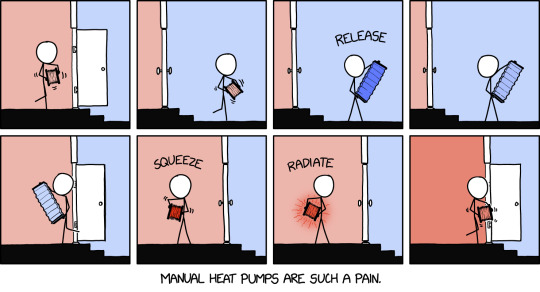
If I'm not going to upgrade to a powered one, I should at LEAST stop leaving the door open so often.
Heat Pump [Explained]
300 notes
·
View notes
Text
A ‘paradise’ for birdlife took flight in the Pennines
An inventor’s ‘pollution sponge’ won a top innovation prize
Publishing giants took a stand against censorship in the US
A restaurant chain gave climate advocates food for thought
The NHS announced a ‘landmark’ trial of AI breast cancer screening
Heat pump sales soared to dizzy new heights
Experts cooked up a rice revolution
Researchers put the UK’s pothole problem on the road to recovery
Lab-grown meat treats landed for eco-friendly pups
A curious badger captured hearts – and a photography prize
Read more from Robin Eveleigh here!
#positive news network#conservation#pollution#fighting pollution#Publishing#censorship#climate advocate#nhs#breast cancer screening#heat pump#rice#lab-grown meat#badger#photography
7 notes
·
View notes
Text
You Don't Want a Gas Stovetop
vlogbrothers, Hank Green
youtube
.

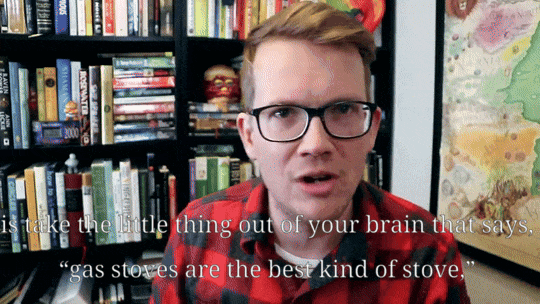


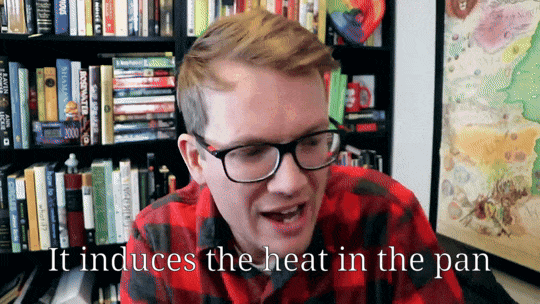


.
Transcript (emphasis mine):
Good morning, John. I've had a half a cup of coffee, and I'm going to do something I almost never do I'm going to make an unscripted video about a thing that I care very passionately about
You watching this video need to not want a gas stove
Why? Because they suck!
Here's the thing that you are right about. The curlicue heating element stoves, they are the worst. They're hard to clean, they're extremely hard to control, like you cannot turn them on and off quickly. They take forever to heat up, they take forever to cool down
Now what happened is the stove top and natural gas industry made it so that what takes the place of that in your brain is a natural gas stove that has like the little blue flames – they're so beautiful – that like Gordon Ramsay used. But what you're doing when you have a natural gas stove is burning stuff in your home! Which results in, get this, decreased indoor air quality. How you can get around this by like having your fume hood like going full blast and certainly never have a natural gas stove that doesn't have a hood. Or get this?! You can have an induction stovetop that has more power and is easier to control than natural gas!
Chances are, there are three pipes connected to your house. There's the one that brings you water, that one's important. The one that takes the water away, we also want that. And the one that brings you methane. What century is this?!
It would be like having the gas station bring the gasoline directly to your car. Like this is a bad idea!
Now I know what you're thinking, “Hank. There is no way that cooking my hellofresh is significantly adding to climate change.” And you're right
But here's the thing, household natural gas use is a big contributor to climate change, it's just not mostly the stove top. However when natural gas companies ask people how they feel about switching their furnace from gas to electric or their water heater from gas to electric, they're like, “I don't care, whichever is better, I don't know.” Because you currently have a really efficient way to get power into your home that isn't a pipe full of methane! It's a power line! And there are great electric water heaters, and there are great electric furnaces and heat pumps, but people say, “I want my natural gas stove.” But that's a tiny percentage of the methane that is actually being sold by the gas company. Almost all of it is used in furnaces and water heaters. But as long as people are like, “I want to keep my gas stove, it's harder to clean, it makes the air inside my house dirty, but House Hunters says that it's a top tier product,” people will keep having the natural gas companies build and replace this extremely expensive infrastructure to pipe gas into our homes!
And gas companies are freaking out about this. They're doing all these campaigns about how great gas ranges are, even though they are objectively worse. Because if they can keep that toehold, they can make it make sense to keep giving you gas for those other things that electric could easily replace. But look electric could also easily replace your stove, because induction stove tops are better than gas!
And so one of the most important things that you can do as a person who's concerned about climate change is take the little thing out of your brain that says, “gas stoves are the best kind of stove,” and look at it and be like, “you're a freaking idiot.” Then you throw it onto your induction stove top and nothing happens, because that's not how it works. It induces the heat in the pan. The stove top itself doesn't get hot cuz they're amazing. So you have to put it into a pan, put that on the stove top, fry it up, and have it with butter … This is why I script. That right there, is why I script, so that doesn't happen!
…
It's not important that you replace your gas stove right now. In fact, it's probably best that you don't. It's important that you don't think it's better than induction because it's not. Because at some point in the future, someone's going to knock on your door and say, “This area is about to have its natural gas pipes replaced, and we have to decide whether or not to replace them with infrastructure that will last 60 to 80 years.” And if a bunch of people in your neighborhood say, “Well, I would, but I really like my gas stove top,” it's not going to happen, and we're going to keep burning methane in people's houses for 80 years! I would be sympathetic if gas were better but it's not!
#i post#i link#youtube#i gif#badly but hey i did it#i transcribe#gas#gas stove#induction stove#stovetop#environmentalism#climate change#hank green#You Don't Want a Gas Stovetop#vlogbrothers#furnace#gas furnace#gas line#gas main#natural gas#gas water heater#methane#heat pump#Youtube
7 notes
·
View notes
Text
It’s honestly crazy that it took heat pumps this long to gain attention over resistive heaters when they’re literally just reverse air conditioners. Like, you could install a window AC unit backwards, and congratulations, you have the world’s first window unit heat pump. But noooo. Let’s spend copious amounts of electricity to generate trivial amounts of heat, or better yet, burn a toxic gas and give our children asthma. That’s soooo much better than adding a reversal valve to the technology we all already have installed in our homes, that’s been around since the nineteen-fucking-hundreds.
24 notes
·
View notes
Text
Hear me out, Heat pumps combined with solar panels work. Even some of the most conservative people I know of who within the last year had their house converted to run on such a system, suddenly changed their tune about solar panels and green energy. Why? Because it saved them money heating and powering their oversized house.
But now they are opposed to the idea of it being rolled out to poor people too, for free, paid for by the Apple Tax surplus. We could give every home in this country cheaper energy and offset their carbon emissions. But neoliberals don't want that. They get so offended at the idea of helping poor people reduce their costs.
And to add insult to injury, these will be the same people who will browbeat poor people when the EU fines us for our emissions with their "we're all in this together" crap. We aren't.
#politics#green energy#ireland#irish politics#climate change#energy conversion#heat pump#solar power#environmental justice
2 notes
·
View notes
Text
Sustainable Jobs Episode 02 - Future Of Heat Pumps!
I am excited to share that the second episode of my Sustainable Jobs web series is now live and featuring the wonderful @harvestthermal 🥳 🎉
A company transforming home heating to reduce emissions by 90% and saving energy costs through their heat pump and thermal battery system!
This tech is paving the way for clean energy solutions, and I can’t wait for you to learn more about it’s impact in our homes. A huge thank you to the Founders Jane Melia, Ph.D. & Pierre Delforge who welcomed me into their home to introduce me to their system.
Energy access is essential to me because millions of Americans struggle with the cost of living in a world where rising energy bill costs are increasing. One way homeowners can take action is by powering their homes to be sustainable through electrification. I got to learn about the duck curve, the issue with our energy industry today and how we can shift away from natural gas in our homes!
Thank you to my friend trent wolbe, who loved the idea of the Sustainable Jobs web series and believed in my mission to showcase to young people the number of sustainable careers that are paving the way for a bright ecological future.
Tune in the link in my bio to watch the full episode.
Credits: Host: Isaias Hernandez Producer: Isaias Hernandez Videography: Fine Grain Pictures (@finegrainpictures ) Post Production: Stranded Astronaut Productions (@strandedastronaut )
Check out the full episode below
youtube
#climate change#sustainability#environment#climate crisis#climate solutions#ecology#solar energy#heat pumps#heat pump#hvac#Youtube
4 notes
·
View notes
Text
https://www.arizonaacandheating.com/service-areas/goodyear-ac-heating/
Goodyear Arizona AC, Heating, HVAC, Air Conditioning Contractor


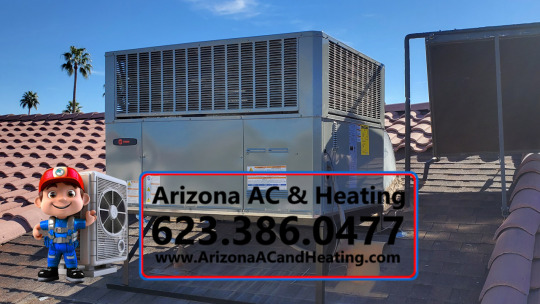
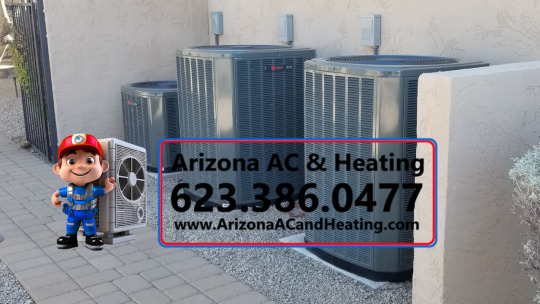
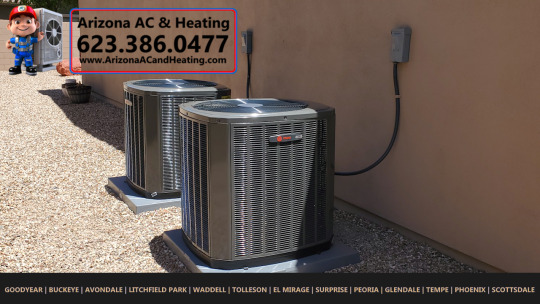






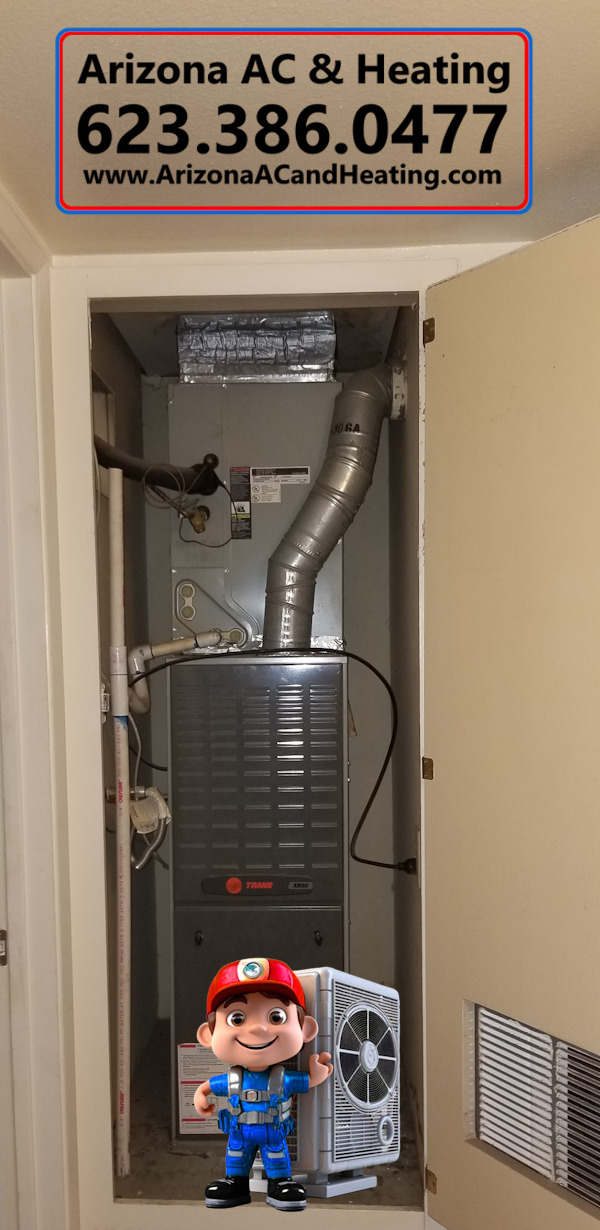

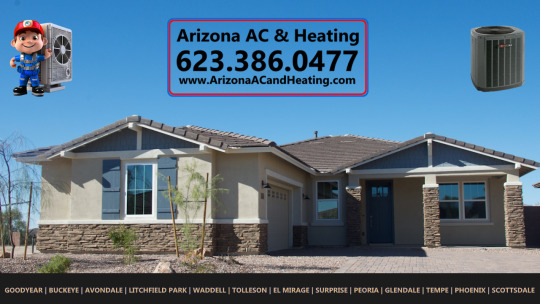






If you are looking for a reliable, honest, experienced, and fair-priced HVAC, Heating, and Air Conditioning Contractor in Goodyear, Arizona, you have found them! Introducing Arizona AC & Heating, your local HVAC experts for residential and commercial air conditioning and heating, including AC Units, split systems, roof-top package units, heat pumps, gas furnaces, and air handlers. We are an Authorized Trane Installation and Warranty Service company serving Goodyear, Arizona. We service all makes and models of air conditioning, heating, ventilation, and air handling systems. Find out why Arizona AC & Heating is the BEST in the WEST… Valley! Cold Air or Heat - We Can't Be Beat!
Contact Arizona AC & Heating in Goodyear, Arizona
#Goodyear#HVAC#AC#Air Conditioning#Heating#Contractor#Arizona#Heat Pump#Furnace#Split System#Rooftop
2 notes
·
View notes
Text
The Importance of Heating And Cooling Solutions: Making Sure Comfort as well as Effectiveness in Every House
HVAC (Home Heating, Ventilation, as well as Cooling) systems have become a crucial part of our every day lives, supplying us with the convenience and comfort we need in our houses. These systems play an important function in keeping a comfy indoor temperature, making certain proper air flow, and enhancing air top quality. With severe climate condition ending up being extra usual, it is very important to understand the value of a/c systems and also how they add to our general wellness.
Paragraph 2: Among the essential advantages of heating and cooling systems is their capacity to regulate interior temperature levels, giving heat throughout chilly winters months as well as amazing relief throughout scorching summer seasons. This not just develops a comfortable living environment but likewise aids avoid health problems created by extreme temperatures. Additionally, a/c systems make sure proper air flow by distributing fresh air throughout your house, reducing the danger of airborne impurities and improving interior air top quality. By removing dirt, allergens, and also pollutants, these systems play an essential function in keeping a healthy home for people with respiratory system problems or allergic reactions. Additionally, heating and cooling systems boost energy performance by successfully taking care of the usage of electrical energy, leading to reduced utility expenses and lowered carbon footprint.In final thought
, heating and cooling systems are greater than just a luxury; they are a necessity in today's modern-day residences. From keeping a comfy temperature level to advertising much better air top quality, these systems significantly add to our general health. Whether it's chilling wintertimes or scorching summers, cooling and heating systems make certain that our residences are a sanctuary of convenience and also effectiveness throughout the year.
Read more here https://morehartac.com/
2 notes
·
View notes
Text
Winter is cold so keep your water warm. save some money with a new heat pump.
Here to help
3 notes
·
View notes
Text
"Heat stored underground in caverns can be set aside in Finland’s summer months to be re-used during frigid winters thanks to a state-of-the-art ‘seasonal energy’ storage facility.
Slated for construction this summer near Helsinki, it will be the largest in the world by all standards and contain enough thermal energy to heat a medium-sized city all winter.
Thermal exchange heating systems, like those built underground, or domestic heat pumps, are seen as the most effective way available of reducing the climate-impact of home heating and cooling.
Their function relies on natural forces or energy recycling to cool down or heat up water and then using it to radiate hot or cold energy into a dwelling.
In Vantaa, Finland’s fourth largest city neighboring the capital of Helsinki, the ambitious Varanto seasonal energy storage project plans to store cheap and environmental friendly waste heat from datacenters, cooling processes, and waste-to-energy assets in underground caverns where it can be used to heat buildings via the district heating network whenever it is needed.
In Finland and other Nordic countries, the heat consumption varies significantly between seasons. Heat consumption in the summertime is only about one-tenth of the peak load consumption during the cold winter months.
Varanto will utilize underground caverns equal in space to two Maddison Square Gardens—over a million cubic meters—filled with water heated by this waste heat and pressure that will allow the water to reach temperatures of up to 300 degrees Fahrenheit without the water boiling or evaporating.
youtube
“The world is undergoing a huge energy transition. Wind and solar power have become vital technologies in the transition from fossil fuels to clean energy,” says Vantaa Energy CEO Jukka Toivonen.
“The biggest challenge of the energy transition so far has been the inability to store these intermittent forms of energy for later use. Unfortunately, small-scale storage solutions, such as batteries or accumulators, are not sufficient; large, industrial-scale storage solutions are needed. Varanto is an excellent example of this, and we are happy to set an example for the rest of the world.” ...
“Two 60-MW electric boilers will be built in conjunction with Varanto,” adds Toivonen. “These boilers will be used to produce heat from renewable electricity when electricity is abundant and cheap. Our heat-producing system will work like a hybrid car: alternating between electricity and other forms of production, depending on what is most advantageous and efficient at the time.”
... Construction of the storage facility’s entrance is expected to start in summer 2024, while it could be operational as early as 2028."
-via Good News Network, April 12, 2024. Video via VantaanEnergia, March 10, 2024
#solarpunk#heat pump#renewable energy#heating#finland#energy transition#climate change#climate hope#good news#hope#helsinki#clean energy#Youtube
400 notes
·
View notes
Photo

Adorkable Twilight & Friends - “Choose Sides”
https://www.patreon.com/adorkabletwilightandfriends
https://twitter.com/AdorkableTwili1
http://adorkabletwilightandfriends.wikia.com
http://adorkabletwixfriends.deviantart.com
#Choose Sides#adorkable twilight#adorkable twilight & friends#adorkable#air conditioning#hvac#heat pump#hat#starlight glimmer#moondancer#twilight sparkle#blake#spike#argument#fight#pushing#spicy
95 notes
·
View notes
Text
youtube
One year after Russia invaded Ukraine, analysts think Putin's aggression may have sped up Europe's energy transition. How's that?
Credits:
Reporter: Ajit Niranjan
Video Editor: Nils Reinecke
Supervising editor: Michael Trobridge, Malte Rohwer-Kahlmann
We're destroying our environment at an alarming rate. But it doesn't need to be this way. Our new channel Planet A explores the shift towards an eco-friendly world — and challenges our ideas about what dealing with climate change means. We look at the big and the small: What we can do and how the system needs to change. Every Friday we'll take a truly global look at how to get us out of this mess.
#PlanetA #UkraineWar #EnergyCrisis
Read more:
European Commission data on imports of Russian fuel:
https://ec.europa.eu/eurostat/statist...
The International Energy Agency's 10-point plan to cut demand for Russian gas: https://iea.blob.core.windows.net/ass...
The IEA's guide to avoid gas shortages in 2023:
https://www.iea.org/reports/how-to-av...
EMBER's review of European electricity:
https://ember-climate.org/insights/re...
The IEEFA's analysis of European LNG:
https://ieefa.org/articles/over-half-...
Chapters:
00:00 Intro
00:50 Eggs & baskets
02:20 Back to coal?
04:27 Renewables push
05:38 Humble heat pumps
07:23 Use less?
09:15 Future
10:47 Conclusion
#dw planet a#solarpunk#Europe#Russia#ukraine#ukraine war#Putin#green energy#clean energy#renewable energy#fossil fuels#coal#oil#heat pump#Youtube
4 notes
·
View notes
Text
Make the Most of Your Pool with a High-Performance Heat Pump
Pool heat pumps are worth it if you want to extend your swimming season, enjoy a more comfortable water temperature, and save money on energy costs compared to traditional heating methods. While the initial cost of a heat pump may be higher, they are more energy-efficient and require less maintenance, making them a cost-effective long-term investment for any pool owner. Additionally, pool heat pumps are eco-friendly and use renewable energy sources, making them a more sustainable option for heating your pool.

3 notes
·
View notes
Text

2023 / 16
Aperçu of the Week:
"With so many things coming back in style, I can't wait until morals, respect and intelligence become a trend again."
(Denzel Washington, US-American actor)
Bad News of the Week:
In recent days, the spotlight has shifted to a country that should have done so sooner because of its problems: Sudan. For 30 years, the autocrat Umar al-Bashir, who came to power in a military coup in 1989, led (not to say suppressed) Sudan with a hard hand, it is an unfortunately classic state story in Africa. Since South Sudan's independence in 2011 at the latest, the country, wracked by regional separatist movements, has no longer been a functioning state. After al-Bashir was deposed - by a military coup, of course - the military leadership and the opposition agreed on a transitional government that was supposed to democratize the country and prepare it for free elections. What didn't happen.
Now two factions of the military are fighting each other for power: the Sudan Armed Forces (SAF) under de facto head of state General Abdel Fattah Burhan and the paramilitary Rapid Support Forces (RSF) under his former deputy General Mohammed Hamdan Daglo, better known as Hemeti. Both lead the so-called Sovereign Council, which is effectively a military junta. Fighting began when RSF troops took control of the Soba military base south of the main city of Khartoum a week ago. Since then, there has been fighting over strategic locations such as the international airport and the headquarters of state television, and there have been constant explosions and confrontations throughout the city, which have reportedly already claimed the lives of some 500 civilians.
The population is largely holed up in their homes. Without supplies of food or medicine, and often with outages of electricity and water, the suffering of the people is unimaginable. Foreign countries call for a ceasefire and evacuate their diplomatic personnel and some of their nationals. That's it. There is no real leverage, and military intervention is unlikely, given the increasing withdrawal from comparable conflict areas in recent years, such as Mali. Is there any reason for hope? I fear not.
In the future, Sudan will vegetate as a failed state just like Libya or Iraq. Only this time, probably without an ultimately useless intervention by the West. It will be interesting to see whether China, which has been present in the south since the 1970s and is a kind of godfather to South Sudan, will intervene again. This is supported by the fact that China is increasingly buying influence on the African continent if, for example, there are rich mineral resources, as in this case. The fact that they have never intervened militarily, which would probably be indispensable in this case, speaks against it. In any case, it will end badly for the population. Whether with or without China, there will be no human rights, prosperity, democracy, welfare state, domestic peace, education for all, and so on.
Good News of the Week:
What a lot of ranting there is about government and its reluctance to take effective action against, or at least mitigate, the effects of climate change. The four biggest areas where change is needed are industry, energy, transportation and construction/housing. Industry is already on a solid path and reached the set targets - albeit with the help of pandemic-related production reductions - in 2022. In energy (generation), at least something is happening, although too little. There is hardly anything to be seen in the area of transportation, which is not surprising in view of the car lobby, the traditionally conservative ministry and various taboo topics such as a speed limit.
Let's move on to construction and housing. The first part is partly industrial, for example the production of building materials, and partly private, i.e. dependent on the owners - for example the decision to install thermal windows. In addition to private energy consumption, which can also be covered (in part) by photovoltaic systems on the roof, the dominant issue is heating. The majority of German heating systems are still powered by oil or gas. Which, in addition to the dependencies for which we are now all paying bitterly, is above all extremely harmful to the environment. As is always the case when a fossil fuel is burned.
So a paradigm shift is needed here. For example, by replacing a gas boiler with a heat pump. This is currently regarded as the ideal solution because, apart from the operating electricity, which can come from renewable energy sources, it only needs to convert thermal energy. A bit like a refrigerator, but in the opposite direction. The problem is that high peak temperatures are not reached, usually at 40 degrees Celsius is the end. In well-insulated houses that have large radiating surfaces such as underfloor heating, this is sufficient. In poorly insulated houses, where a classic radiator is usually also placed on a thinner wall of all places under an old window, this is often not enough.
Last week, an amendment to the Building Energy Act was now presented by the green-led Ministry of Economics and approved by the cabinet. The key point: as early as next year, all newly installed heating systems must be powered by at least 65 percent renewable energy. This effectively means the death of all oil and gas heating systems, with the latter having a shaky future with hydrogen - which, however, is not yet available at the moment and will be very expensive later on. This leaves electric heating. And the mentioned heat pump, which is more expensive than, say, a gas boiler, combined with cost-intensive building renovations required because of the radiation surfaces and insulation.
This is hitting the population at precisely the time when new construction financing and, above all, rental cost levels are going through the roof anyway. Particularly in areas that are in demand and characterized by an influx of people, such as here in the Munich area, housing is slowly becoming a luxury that often already eats up more than half of the income. For this reason, the state offers subsidies of between 30 and 50 percent for the replacement of fossil-fuelled heating systems. Regardless of whether this is voluntary and proactive or forced because the old system is simply no longer repairable or maintainable. There are also subsidies or at least low-interest loans with repayment subsidies for the accompanying renovation.
The good thing about this is not only that climate-friendly measures and only climate-friendly measures are finally being subsidized. When it comes to mobility, for example, driving a car is still treated in exactly the same way as taking the train. The ambitious timetable is also good. As I said, the law will take effect as early as next year and is not, as is so often the case, just some lax target agreement by the end of the decade. Yes, this will be problematic, as there are likely to be bottlenecks in both heat pump manufacturing and their professional installation. But that doesn't have to matter. Otherwise, we'll end up in an infinite loop like with electromobility: vehicle sales stall because there's a lack of charging capacity. And these are not being created because demand is too low, since not enough e-cars are being bought. Those who only invoke the dilemma of a Catch 22 situation will never get off the ground.
Personal happy moment of the week:
At work, I was able to successfully coordinate that I will have a week off in about two months. After that never worked out last time, because I stayed at home - too close to the home office - this time we will go on a trip. Namely to the "The sea of stone" in the Austrian Alps. Where there is no digital accessibility at our mountain inn. Smart move. Actually, I could have thought of that earlier.
I couldn't care less...
...that Michael Kretschmer from Saxony is now the first German prime minister to call for a stop to the immigration of refugees. Even for former local staff from Afghanistan. Not everyone has yet understood that our society needs immigration to maintain its prosperity. Especially against the backdrop of aging and a shortage of employees, especially in less demanding fields of activity. The real problem, after all, is the lack of integration and qualification. Both are not only a debt to be collected, but also a debt to be brought.
As I write this...
...Ramadan is coming to an end. For the first time this year I have seen it with different eyes. Thanks to my new work colleague Tarek. A Syrian. And Muslim. That reminds me that I have a Koran - fortunately in an annotated version for amateurs - on my bookshelf. Which I will (hopefully soon) read. Because just like the Bible, it is far more than just a religious pamphlet. It defines the cultural basis of whole nations. And this foundation should be known. And respected. Especially to enable one to evaluate dubious spin-offs by oneself.
Post Scriptum
Last week, former German Chancellor Angela Merkel received a medal. The "Grand Cross in Special Execution." As the third bearer after her predecessors in office Konrad Adenauer and Helmut Kohl. Of course, there was not only praise in this context, but also criticism. Both justified. In her 16 years in office, she "outlasted" 13 party leaders of the Social Democrats, the primary political competitor of her conservative party, the CDU.
So I'll take the liberty of quoting the current incumbent, Saskia Esken: "Her opponents - from her own ranks as well as from outside - cut their teeth on her integrity and her fine sense of humor." Merkel's "diplomatic skills and empathic wisdom, with which she repeatedly succeeded in forging viable coalitions and compromises on both the national and international stage," she said, deserved special praise. Because: "Especially in our troubled and crisis-ridden times, an almost invaluable skill." Merkel, she said, had therefore "navigated Germany with a sense of proportion through the many crises of her time in office."
#thoughts#aperçu#good news#bad news#news of the week#happy moments#politics#denzel washington#trending#Sudan#failed state#africa#south sudan#china#climate change#fossil fuels#heating#mobility#housing#heat pump#holiday#refugees#immigration#ramadan#koran#angela merkel#austrian alps#catch 22#gas#military coup
2 notes
·
View notes